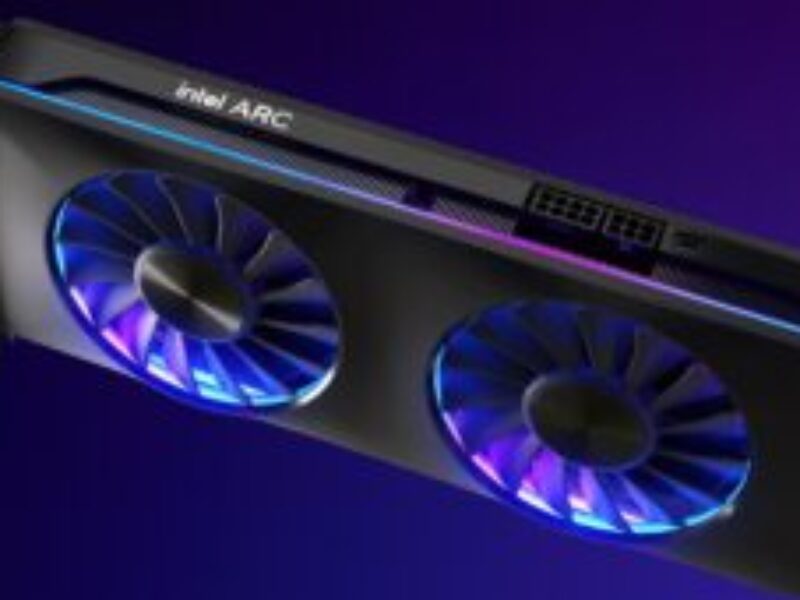Intel Arc GPU: The GPU That Gamers Are Waiting For
The Intel Iris graphics technology supports vibrant and vivid entertainment experiences. This offers a 4K HDR and the performance needed for 1080p gaming. Intel core processors come up with Intel that can deliver exciting visuals with sharp colors and fast frame rates per second.
Performance:
The Intel ARC GPU has advanced modernity, not just hardware. The top-tier Arc A770 can mash up the competition in games running with modern graphics.
Typically, in current titles like Metro Exodus and Borderlands 3, Intel Arc graphics offer a performance uplift compared to the Nvidia GeForce RTX 3060 and AMD Radeon RX 6600, both at 1080p and 1440p.
Driver optimization is still a work in progress. So AMD and NVIDIA have a clear edge in games like Cyberpunk 2077 and F1 2020 at 1080p.
DirectX 11 Support:
An Intel Arc shines in modern games with DirectX 12. This also comes with Vulkan support, but there’s a problem. Many games still use DirectX 11, like Think indie games or even AA projects (titles with tangible investment and resources, but not the vast blockbusters).
Ray-tracing Capabilities:
It refers to a new rendering technique that produces more realistic visuals and light effects for improved immersion.
With the help of real-time ray tracing support, you can enjoy an advanced level of graphics detail and realism in your games.
Deep Learning Super Sampling (DLSS) boosts performance by rendering frames at a lower resolution and then upscaling them.
Now NVIDIA can no longer claim the top spot in graphics technology.
Intel Deep Link Technology:
This technology delivers intelligently-boosted performance. Intel deep link technology uses the central processor, integrated graphics, etc. To handle heavy organizational workloads, it uses an Intel Arc GPU, which is similar to a discrete GPU.
For further improving performance, there are many features:
- Hyper Encode:
By adequately utilizing different media search engines, encoding gets accelerated. With faster encoding, you can create content faster.
- AI-enabled Editing:
It becomes essential for photographers and video editors to edit and customize photos and videos as per their requirements. Thanks to an advanced AI-enabled editing system that smoothly edits images and videos without lag.
- Dynamic Power Sharing:
Smart power sharing between GPUs and CPUs helps improve performance.
- Streaming:
Your dedicated graphics can manage heavy workloads for a better gaming and streaming experience.
XeSS Supersampling:
XeSS takes your gaming to the next level. It uses AI-enhanced upscaling. It enables more performance with high image fidelity. You can experience ultra-high-definition visuals with high performance powered by hardware acceleration. You can also get an AI-based algorithm.
Intel has built XeSS on open standards and continuously collaborates with giant game manufacturers to boost adoption.
Thanks to Intel’s Deep Link Technology, Arc GPU developed unique features that helped them work incredibly well with the company’s 12th Gen Alder Lake CPUs.
Intel is the company that supports AV1 encoding. It’s a form of encoding that improves image quality while reducing the bandwidth needed to view the video. This is a massive boon for streaming and capture uploads, as far as Arc AV1 testing denotes.
Intel has also fixed up many issues during the review period with the games that failed to launch together. This app crashes using a specific API mode or features like ray-tracing and game corruption.
These Intel Arc GPU graphics enhance the gaming experience. This uses advanced technologies such as ray tracing and AI-based upscaling. Consequently, Intel Arc benchmarks are more powerful compared to Intel integrated graphics.
Support for High Refresh Rates and Resolutions:
Intel Arc GPUs were positioned to support high refresh rates and resolutions, making them suitable for gaming at 4K and even beyond. Gamers could expect a more fluid and responsive experience, especially in fast-paced titles, thanks to the GPUs’ capacity to deliver high frame rates.
Adaptive Sync:
To further enhance the gaming experience, Intel Arc GPUs were anticipated to offer support for variable refresh rate technologies like G-Sync and FreeSync. These technologies reduce screen tearing and stuttering, ensuring a smoother and more tear-free gaming experience, especially when paired with compatible monitors.
Comprehensive Software Stack:
Intel’s commitment to providing a holistic user experience extends to their software ecosystem. The GPUs were expected to come with well-optimized drivers, game-specific settings, and developer tools. This holistic approach aimed to deliver a seamless and user-friendly experience, ensuring that gamers could get the most out of their Arc GPUs.
Intel’s Graphics Command Center:
The Graphics Command Center was poised to serve as the central hub for managing and configuring Intel Arc GPUs. Users could expect a user-friendly interface that allowed for customization of graphics settings, performance tuning, and access to additional features, making it easier to personalize the GPU experience to their preferences.
Integrated Graphics:
In addition to discrete GPUs, Intel was planning to integrate Arc GPUs into their processors, providing integrated graphics with a substantial boost in performance and capabilities. This would make laptops and desktops equipped with these processors well-suited for a wider range of tasks, from casual gaming to content creation.
Support for Display Technologies:
Intel Arc GPUs were likely to incorporate support for modern display technologies such as HDMI 2.1 and DisplayPort 2.0. These advancements would enable features like 8K resolution, higher refresh rates, and improved color depth, ensuring compatibility with the latest and most advanced displays for a visually stunning experience.
Bottom Line:
Intel Arc Graphics offers a range of functionalities like AI-enabled editing, advanced hardware processing, hyper-encoding, dynamic power sharing, and so on. These features offer an edge compared to other graphics technologies.
Read More:
